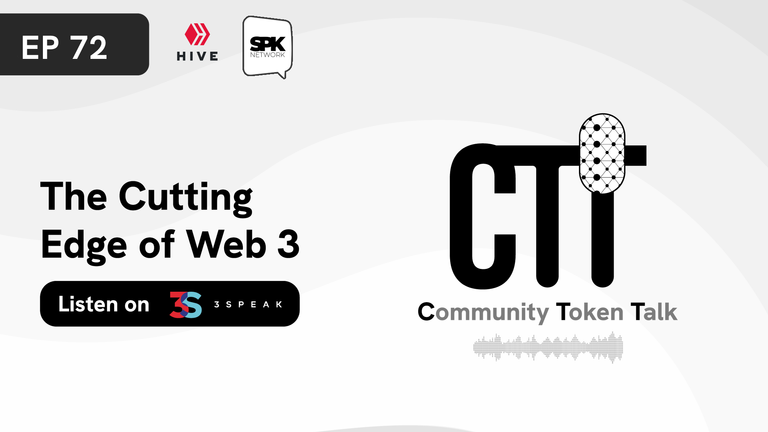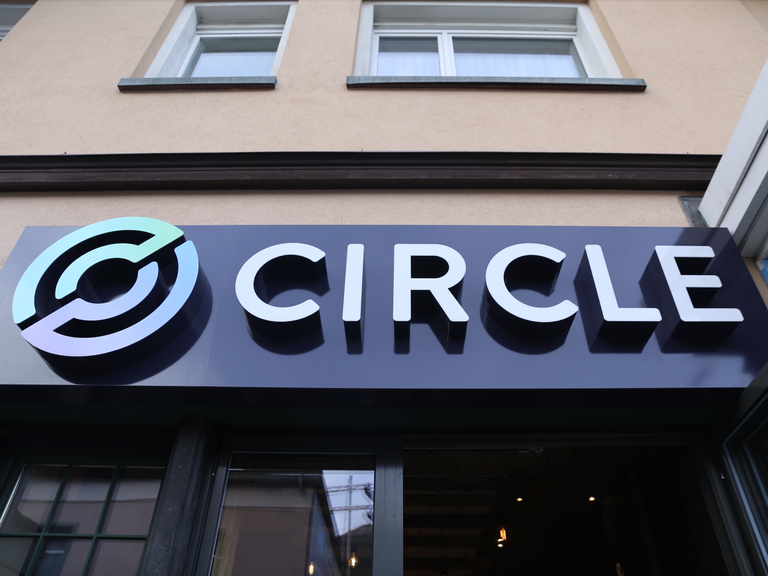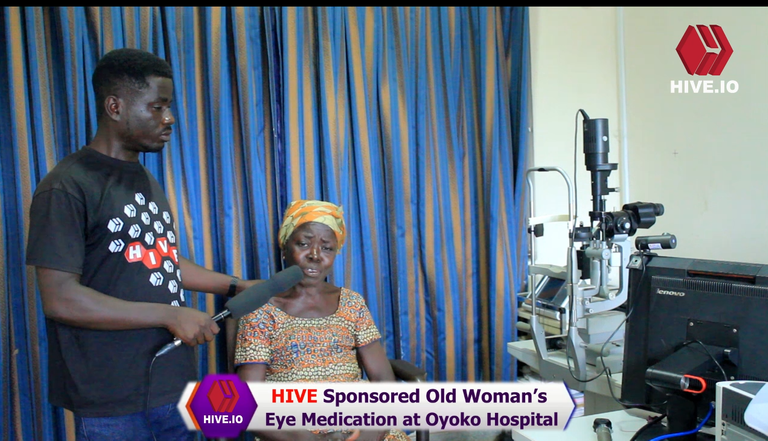Community Token Talk Podcast - Ep. 72 | Latest in Web3

The CTT Podcast is hosted by @starkerz and @theycallmedan, co-founders of @threespeak.
https://twitter.com/fiatjaf/status/1659660455156039681?s=46&t=-KxM0zFkgyJ6HnTuQ-VqWg
USDC Will Be The True Fedcoin

https://github.com/Qortal/qortal/releases/
Technology for Social Good

https://twitter.com/edger_k/status/1658986097496522758?s=46&t=zMGeXu-eUB15TZQEEMX5nA
https://twitter.com/chrisblec/status/1658608274143580160?s=46&t=cG6uD9GO1EOcF3AiEpcDcg
New CTT Podcast Shorts Account:
https://twitter.com/CTT_Podcast/status/1657554365715021824
SPK Network YouTube Channel
The rewards from these posts are split among:
@bil.prag - He helps us make shorts on the @spk.network account and the YouTube Channel.
@enrique89 - Marketing and design.
And @eddiespino - Eddie helps download all the episodes from Twitter space, gather all the important links, and post the episodes to 3Speak.
SPK Network LinkTree
3Speak LinkTree
▶️ 3Speak
0
0
0.000
That took a while, thanks for the Upload!
00:10 - Bye bye BTC decentralization
3:00 - (Dan) Proof of work Vs. Hive
4:34 - @brianoflondon comment: mining pools mess up accounting / BTC attack vectors / Mining pools cant be voted out.
6:46 - let's play a quick jingle!
7:09 - USDC will be the new FEDCoin @taskmaster4450
8:06 - When your liquidity isnt an algo stable coin attached to your layer 1
a centralized stable coin can attack your network.
9:27 - Bitcoin as a liquidity layer.
11:15 - BTC is a crippled data available layer, and needs hive.
13:00 - You cant brute-force censorship resistance.. it's like a cat.
13:45 - @mcsamm [Technology for social good]
14:44 - Have you heard of Qortal https://qortal.org/
18:00 Shoutout to LeoFinance/Threads! 12K threads in 24 hours!
19:13 - SEC warns FileCoin meets the definition of a security.
24:55 - PulseChain bridge is owned by 1 EOA admin key.. Duh!
26:44 Global-Affairs Tweet / Twitter will be regulated.
29:05 - In Mexico you can pay some fee's with V4V @brianoflondon
30:38 - ....... So we're gonna publish a book .......
- And we wanna work with others on it! -
- The book is about decentralization -
31:40 - What are we talkin about
33:17 - How Dan Looks at things
37:48 - How Matt looks at things
38:54 - (Dan) The FAKE scaling-trilemma
42:33 - (Matt) Code is law?
45:44 - (Dan) plants the S.I.P. Seed
48:17 - (Matt) Takes big a SIP
50:15 - THE MAGIC WORD! Rosarito!
51:15 - (Dan) Decentralized Coin Distribution
53:14 - (Matt) Proof-of-brain distribution
58:20 - (Dan) Social Distribution is a TrojanHorse
59:30 - (Matt) Ongoing Distribution (Hyper inflation?)
1:02:39 - (Dan) Inflation on Coin-voting Layer 1
1:05:13 - Inflation on layer-2?
1:05:38 - (Matt) Keeping inflation in check
1:07:36 - (Matt) Distribution: What you wanna see & what you don't wanna see.
1:10:59 - What Dan sees
1:15:10 - (Matt) Application of "Semi-Centralized" models.
1:16:16 - (Dan) We're not against Pre-Mines?
1:18:20 - (Matt) You will get contacted.. If you have a pre-mine.
1:20:48 - (Dan) You cant brute force censorship resistance.
1:22:35 - (Matt) For the people listening in the future.
1:23:53 - (Matt) Founder stake size & major stake holder dominance.
1:25:57 - (Dan) Looking into the future of coin distribution.
1:30:08 - Matt reads and responds to viewer comments
1:31:30 - Final thoughts/Book
Here is a summary article covering the key points discussed in this episode of the Community Token Talk podcast:
Goodbye Bitcoin Decentralization and the Need for Hive
In this episode, the hosts Dan and Starkerz discussed the potential attack vector of "goodbye Bitcoin decentralization." The issue arises from the ability to pay miners off-chain, which can allow large corporations to incentivize certain miners to include their transactions while excluding others. This undermines the fair distribution of mining rewards that occurs on-chain.
The hosts suggested that Hive's decentralized governance model, powered by reputation-based coin voting, could provide a solution to this problem. On Hive, validators (similar to miners) can be easily voted in or out based on their actions, making it difficult for any single entity to exert undue influence. The hosts believe Hive's approach to decentralization is superior to Bitcoin's, as it avoids the risks of off-chain miner incentivization.
USDC as a Fed Coin and Ethereum's Role
The discussion then turned to the potential for USDC to become a "fed coin," with the hosts citing a blog post suggesting that Circle, the issuer of USDC, may be required to store all its assets within a US-regulated entity. This could effectively turn USDC into a central bank digital currency (CBDC), with Ethereum potentially becoming the underlying CBDC platform.
The hosts expressed concern about this development, as it could allow centralized stablecoins like USDC to dominate the Ethereum network's liquidity. They argued that this poses a significant threat to Ethereum's decentralization, as the network would become dependent on a centralized asset.
Bitcoin as a Liquidity Layer and Hive as the Transaction Layer
The hosts then discussed their view of Bitcoin's role as a liquidity layer, with Hive potentially serving as the transaction layer. They explained that Bitcoin's crippled data availability, with its small block size and high fees, makes it unsuitable for frequent transactions. Instead, the hosts envision Bitcoin as a store of value and liquidity, while Hive could provide the efficient, low-fee transaction capabilities needed to scale the Bitcoin ecosystem.
The hosts argued that this division of responsibilities, with Hive acting as a layer-one protocol that can bridge to Bitcoin, is a more viable path to scaling blockchain technology than the approaches taken by Ethereum and other layer-one networks.
Principles of Decentralization and Upcoming Book
Towards the end of the episode, the hosts announced that they are working on a book that will outline the key principles and best practices for building truly decentralized blockchain ecosystems. They plan to cover topics such as:
The hosts invited listeners to participate in the creation of this book, either by providing feedback or by taking on the task of transcribing and editing the audio recordings into a written format. They believe this book will be a valuable resource for the blockchain community, as it will document their insights and experiences in building decentralized systems.
Notice: This is an AI-generated summary based on a transcript of the video. The summarization of the videos in this channel was requested/approved by the channel owner.